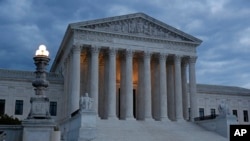After a historic foray into digital technology brought about by the coronavirus pandemic, the United States Supreme Court moves to a string of high-profile, end-of-term cases next week.
From Monday to Wednesday, the justices will hear oral arguments in cases centered on three broad issues: religious liberty, subpoenas for President Donald Trump’s financial records, and whether members of the U.S. Electoral College must vote for the candidate who wins the popular vote in their states.
Typically, the court hears about 70 cases a year, most involving disagreements between lower courts. But with several cases postponed until the fall, the justices will have heard 57 cases this term. That is the fewest in more than a century.
In a break from tradition, this week the court conducted oral arguments by telephone -- and live video stream -- in half a dozen cases. The decision to conduct arguments remotely came after the pandemic forced most government buildings to close.
Here is a look at three major issues that will be heard over the phone and livestreamed next week.
Religious freedom
Nearly every term the Supreme Court considers religious liberty and freedom of conscience issues.
On Monday, the justices will hear arguments in two consolidated cases known as Our Lady of Guadalupe School v. Morrissey-Berru and St. James School v. Biel.
The cases involve two former fifth-grade teachers at two Catholic elementary schools in California. The teachers sued the schools for discrimination after the schools refused to renew their contracts.
The schools argue immunity from employment discrimination suits, citing a doctrine known as “ministerial exception” that bars “ministerial” employees of religious institutions from suing their employers. But the two teachers claim they were employees, not “ministers.”
The Justice Department has filed a friend of the court brief in support of the schools.
Trump financial records
The Supreme Court often shuns political disputes between the other two branches of government. But last year, the justices agreed to hear three separate cases involving Trump’s financial records, including two subpoenas issued by Democrats in the House of Representatives.
The first two cases – Trump v. Mazars USA and Trump v. Deutsche Bank – involve subpoenas issued by two congressional committees investigating Trump’s finances.
The two cases have been consolidated into one and will be heard during one hour of oral argument.
The third case – Trump v. Vance – involves a grand jury subpoena issued by New York District Attorney Cyrus Vance to Trump’s accountants seeking tax returns going back to 2011, as well as other financial records. Vance is investigating the Trump Organization, a real estate company.
Trump’s lawyers asked federal courts in New York and Washington to bar his accounts and banks from releasing his financial records. But the courts, with one exception, rejected his request, sending the cases to the Supreme Court.
The Supreme Court’s decision in the case, expected in the coming weeks, will determine whether Trump will release his financial records ahead of the 2020 presidential election. Unlikely other presidential candidates, Trump refused to release his taxes during the 2016 election and has continued to do so, saying he is under IRS audit.
But it is not clear whether the court will rule one way or another. Last week, the high court asked the parties to the cases, as well as the Justice Department, to file briefs stating whether courts should stay out of the fight because fundamentally it is a “political dispute” between the two branches of government.
‘Faithless elector’ laws
Two consolidated cases slated for oral argument on the final day of the term will examine whether states can require presidential “electors” to vote for the winning ticket in their states.
The United States has a unique system of electing presidents. Instead of voting directly for a presidential candidate, voters elect members of the “Electoral College,” who meet several weeks later to cast their ballots for the president.
Most states require electors to take a pledge to vote for the presidential candidate who wins the popular vote. “Faithless electors” who do not honor their pledge are sometimes punished.
The case before the Supreme Court arose from the 2016 election.
In Washington state, which was won by Democrat Hillary Rodham Clinton, three Democratic electors were fined after they cast their ballots for Colin Powell. In Colorado, another state won by Clinton, a Democratic elector was ousted from his position after he voted for a Republican politician.
The case landed before the Supreme Court after courts in Washington and Colorado reached different conclusions over whether states could punish faithless electors.
In Washington, the state Supreme Court upheld the fine against the faithless elector, but in the Colorado case, a federal appeals court ruled that the state’s faithless electoral law violates the U.S. Constitution.
The justice's decision could have direct bearing on the November election and beyond.
